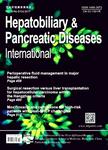The molecular mechanism underlying angiogenesis in hepatocellular carcinoma: the imbalance activation of signaling pathways
The molecular mechanism underlying angiogenesis in hepatocellular carcinoma: the imbalance activation of signaling pathways作者机构:Department of Hepatobiliary Surgery First Affiliated Hospital Zhejiang University School of Medicine Hangzhou 310003 China. zyh037@***
出 版 物:《Hepatobiliary & Pancreatic Diseases International》 (国际肝胆胰疾病杂志(英文版))
年 卷 期:2003年第2卷第4期
页 面:529-536页
学科分类:1002[医学-临床医学] 100214[医学-肿瘤学] 10[医学]
主 题:hepatocellular carcinoma signaling pathway angiogenesis VEGF/KDR angiopoietins/Tie2
摘 要:OBJECTIVE: To explore the effect of two dominating signaling pathways, VEGF/KDR and angiopoietins/Tie2, on the formation of new blood vessel in hepatocellular carcinoma (HCC) growth and metastasis. METHODS: RT-PCR and Western blot were employed to evaluate the VEGF/KDR and angiopoietins/Tie2 expression in samples from 23 patients with HCC. Meanwhile, microvessel density (MVD) was determined as a marker of angiogenesis by counting CD34 positive cells with the method of immunohistochemistry. RESULTS: The two pathways were activated in all HCC samples. The expressions of vascular endothelial growth factor (VEGF) and angiopoietin-2 (Ang2) were significantly higher (P0.05) in hepatocellular carcinoma tissues and the margin of the tumor than those in control groups, and so did CD34 positive cells. Although significant difference in the expression of kinase insert domain containing receptor (KDR) and Ang1/Tie2 was not observed in all groups, their distinct high levels were seen in hepatoma and its margin compared with normal and cirrhotic liver. VEGF and Ang2 expressions were seen up-regulated in HCC with vascular invasion and satellite lesion. CONCLUSIONS: The two signaling pathways, VEGF/KDR and angiopoietins/Tie2 are activated in the process of angiogenesis in HCC and modulate the formation of new blood vessels. The imparity of the two signaling pathways activation is to benefit HCC metastasis. In the two pathways, VEGF and Ang2 may play an important role in the process of angiogenesis, and are necessary indicators for the prognosis and metastasis of HCC. This study provides another clue for the exploration of anti-angiogenic agents.



